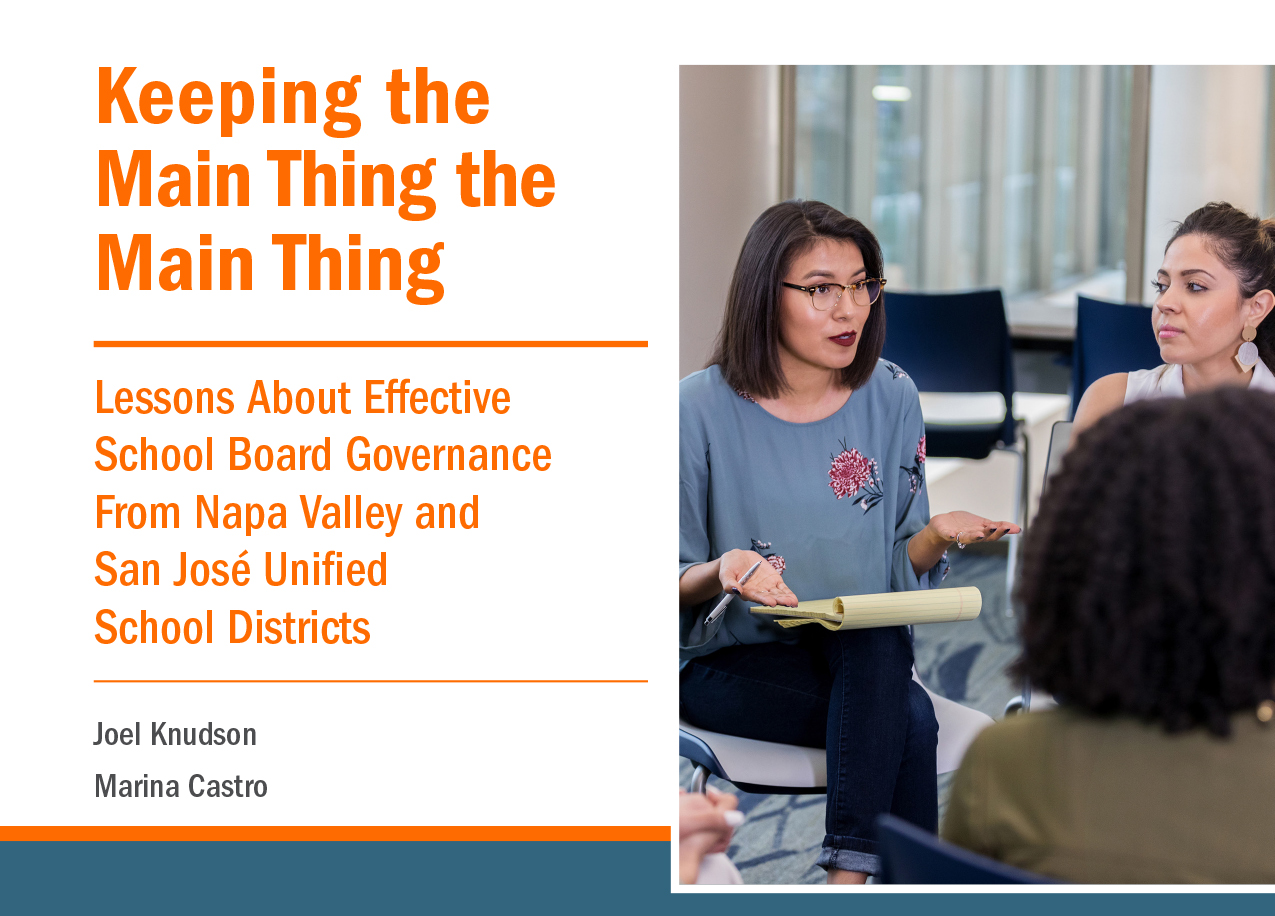The traditional leader preparation approach of “teach and release” is being challenged. To truly create the transformational leaders needed by today’s diverse school communities, coaching must be at the heart of their preparation.
By Marco A. Nava, Delia Estrada, April Ramos, Maura Crossin, Jose M. Rodriguez and Maria Sotomayor
Administrators in the Los Angeles Unified School District (LAUSD) and in districts throughout the nation are being asked to effectively lead communities in increasingly complex times. Today’s leaders not only manage systems, they must be prepared to facilitate and, indeed, lead transformation.
The ideal of the benevolent, top-down, all knowing principal has passed. As Fullan and Quinn (2016) note, today’s educational leaders must focus direction, cultivate collaborative cultures, deepen learning and secure accountability in an era of shrinking budgets. Simultaneously, they must also develop the capacity and assets of human/social capital of their staff to serve diverse communities.
We pursue the ultimate goal of public education: to prepare all students, not some, for a fulfilling productive life. With this in mind, the traditional leader preparation approach of “teach and release” is being challenged in equipping administrators for this emerging leadership role. It is our belief that to truly create the transformational leaders needed by today’s diverse school communities, coaching must be at the heart of their preparation.
Educational leaders are now in the business of building their own capacity, as well as that of others, to become problem solvers, adapt to new conditions, and foster potential in all students. In order to accomplish this purpose, leaders must be aware of their own thinking, perspectives, biases, and their sense of moral purpose. One of the best tools to foster and successfully approach this ideal is coaching.
LAUSD established the Los Angeles Administrative Services Credential (LAASC) induction program as a no-cost pathway for new administrators to clear their administrative services credential requirement. Coaching is integral to the LAASC induction program and LAUSD has committed to investing in and growing its own leaders through a full-release coaching model.
Full-release is when coaches are employed full-time to provide coaching services and professional development for school administrators. An additional benefit of full time coaches is they organize and lead other leadership development programs within the Professional Learning and Leadership Development (PLLD) branch, such as the Aspiring Principal Program, Aspiring Assistant Principal Program, New Principal Support, Supporting New Assistant Principals, Educator Development and Support School Leaders, and Reed School Support.
All of these programs are aligned under the Human Resources Division to ensure consistent and coherent services for participating administrators throughout the district. This allows for maximizing limited resources in the development of urban school leaders. More importantly, this helps maintain alignment of a cohesive mission and vision within HR and LAUSD as a whole.
Coaching provides personalized, safe, job-embedded assistance and guidance. If we are to assist school leaders in moving to a higher level of competence, confidence, performance and insight into their role, coaching is essential.
The intent of this article is to explore the essential characteristics of an effective, high quality, coaching program. LAASC’s coaching model consists of the following components: a) careful recruitment and selection of coaches, b) targeted preliminary training, c) ongoing calibration, d) continued professional learning opportunities for coaches, e) assessment of coaching quality, and f) cyclical refinement of practice.
1. Careful recruitment and selection of coaches
At the heart of an impactful coaching program are effective practitioners. LAASC Coaches must have at least two years of experience as a principal with a proven track record of school improvement and at least eight years of full-time certificated service in a public school. Coaches must possess the ability to communicate effortlessly both in written and oral formats, an understanding of adult learning theory, and preliminary coaching strategies and protocols.
These attributes provide the foundations to ongoing training that coaches receive to add to their toolbox of strategies. Additionally, coaches must possess the ability to establish rapport and engender trust with their candidates, while demonstrating a high level of professionalism and confidentiality.
LAASC program participants are not solely school-based administrators. Non-school-based administrators run the gamut from nursing to mental health, pupil services, as well as specialist positions. The school-based principal experience serves coaches well, as they have had a wealth of interactions with various types of service providers.
LAASC coaches are tasked with serving their candidates in a differentiated manner, as each candidate is in a different place in their career and in their learning. No two are the same, and no candidates have the same needs. An effective coach will adapt and personalize each session to create an environment where candidates feel supported by someone who has walked in their “leadership shoes” and can guide them to the next level.
Coaches must value these approaches and be willing to continue mastering these skills. Coaches are not in the business of giving advice and solutions. They foster the deep thinking required of transformational leaders. As such, they are aware of the need to be reflective of their own professional development. Intentional training is necessary to begin and refine their role as coaches.
2. Targeted preliminary training
In order for a coach to facilitate relevant, meaningful, reflective and actionable coaching conversations, they continually sharpen their coaching saw. Leadership coaching demands a well thought out approach to its introductory training. Preparation of new coaches is rooted in leadership standards, such as the LAUSD School Leadership Framework (SLF), the California Professional Standards for Education Leaders (CPSEL), and the LAUSD Coaching Competencies.
Initial coach training and preparation consists of two to four days of participation in a Commission on Teacher Credentialing (CTC) approved program, such as Cognitive Coaching, Coaching for Equity and Blended Coaching. These professional development experiences paired with the Coaching Competencies, SLF and CPSEL provide a common language and foundational skills for the coaches and high quality implementation of coaching components.
LAASC candidates are eager to advance and improve their leadership practice as measured by the LAUSD SLF and CPSEL; however, they may not have experience and preparation to develop on their own. This is where a coach’s training in providing objective feedback, reflective questions, and modeling techniques becomes essential. The ongoing growth and development of coaches is a critical process.
Learning opportunities, including attending conferences; shadowing and observations of fellow coaches; and engaging in professional reading opportunities on such issues as Improvement Science and cultural proficiency, extend content knowledge. Overall, coaches must engage in their own targeted and reflective process of the LAUSD Coaching Competencies, as this is the model used in all administrator professional development.
The Coaching Competencies include four major components for effective coaching conversations: planning for the coaching conversation, interaction during the coaching conversation, follow-up questions and responses; and action and closure.
3. Ongoing calibration
LAASC coaches meet on a weekly basis to refine their ability to assist candidates throughout the district. During these meetings, coaches calibrate what is shared with candidates, ensuring the messages are consistent and strategies are uniform in practice. In addition, coaches examine if they are meeting both the program requirements and the needs of the diverse candidates. As a result of regular meetings, tools are developed, adapted and refined to meet the various needs of the field and respond to changing times.
Full-time status enables coaches to keep an active pulse on current field practices. It also creates opportunities for coaches to brainstorm ideas to leverage the induction days, connect to current events and their potential impact as educational leaders.
Following the 2016 presidential election, LAASC candidates expressed concerns over potential student walkouts on a scheduled meeting date. The team responded by postponing the session and redesigned the agenda for the new date to include activities incorporating reflections on how candidates supported their learning communities, leading with ethics, integrity, justice and equity. Participants discussed ways they inspired other stakeholders to push toward that goal as well, and demonstrated the principle that the well-being of students supersedes the interests of any one community member.
Similarly, when changes to Deferred Action for Childhood Arrivals (DACA) were initially proposed, the impact this policy shift would have on LAUSD students, families, school and district-level leaders was immense. The team used CPSEL 6, External Context and Policy, to frame the development of activities to support them and their learning as we moved forward. Coaches began sharing the district’s current policy, so leaders could promote greater public understanding of this emerging trend in education and facilitate discussions with their communities about the proposed changes.
Reviewing the shifts around undocumented students provided a foundation for the LAASC team to introduce some available resources and facilitate conversations on how to advocate for equitable public policies that support the growth and well-being of all students. Not only did participants receive contact information for relevant legislators, they had an opportunity to share their best practices.
Maintaining flexibility in the curriculum and calibrating regularly supports this work. These experiences, in turn, inform professional development explorations for the coaching team.
4. Continued professional learning opportunities for coaches
Although initial professional development sets a foundation for effective coaching, LAASC coaches are continuously identifying professional learning opportunities to strengthen their ability to support candidates. The LAUSD Coaching Competencies provides a roadmap to plan and conceptualize interactions with candidates. This framework is used to identify specific coaching strategies and protocols, and identify alternate ways to enhance coaching skills.
For example, a common area of need was providing support and modeling to teach a specific administrative or instructional task in a gradual release model, so the candidate eventually demonstrates the ability to do the task independently. Since the onus of the interaction is dependent on each candidate’s needs, we identified “The Art of Coaching Teams” as a resource to add to our toolbox, as it included effective strategies in this area as demonstrated in the following two examples.
A candidate, Michelle Castelo Alferes, was recently promoted to director of pupil service. Her area became facilitating teams as the department grew to include 28 administrators and nearly 500 counselors. Based upon the reflection opportunity with her coach, she incorporated specific protocols for her biweekly meeting and professional developments. She also infused strategies and techniques learned from induction day experiences to focus and target the team’s work. With her coach’s support, she was able to facilitate an infrastructure to sustain social-emotional learning focused on teams, and not just individuals, and a shift from compliance to commitment.
Dr. Jared DuPree, high school principal, began examining data from an ongoing mathematics consortium he convened featuring multiple teachers and their leaders and found varying levels of student growth correlated to school participation. Pausing for reflection, he asked how this team’s work supported the larger mission and goals and used the evidence from the consortium to support that our schools continued to have critical needs in the area of math instruction.
The coach supported the principal’s thinking by helping him think about whether these variances might be due to will gaps or skill gaps. This led to the revision of his plan and re-thinking of strategies to how he will lead this group of people into healthy learning and teaching relationships.
These anecdotes demonstrate that coaches learn, adapt and evolve based on their experiences with their candidates. Coaches are in a continual cycle of learning about the needs, challenges and perspectives of those candidates. The information gathered also informs the topics to explore as a team and on behalf of those they serve.
To date, the team has chosen to delve deeper into Bryk’s “Learning to Improve” (2015) and Lindsey’s “Culturally Competent Coaching” (2007) to better assist their candidates.
5. Assessment of coaching quality
To help improve practice, coaches receive feedback regarding the impact and quality of their coaching through a variety of sources. In order to obtain non-biased, objective, honest feedback from program participants, an LAUSD research team, external to LAASC, was recruited to develop and administer a survey protocol, conduct focus group interviews, and to observe and script each coach during coaching conversations.
The online survey protocol included questions around the quality of implementation of the LAASC program components. For this article, the focus is on the year-one coaching aspects of the program. One hundred and seventeen LAASC participants were asked to complete the survey and an 88 percent response rate was received. Responses from LAASC candidates included:
- 99 percent agreed that their coach guided them to find their own solutions to the issues/concerns they faced.
- 100 percent agreed that their coach provided appropriate and constructive feedback on their work.
- 97 percent agreed that their LAASC coach has been instrumental to their growth as a leader.
In order to delve more deeply into the survey responses, focus group interviews were conducted. Approximately 26 participants were invited to the focus group interviews. Twenty participated in four small focus group sessions. Focus groups consisted of school site and non-school site, elementary and secondary administrators.
Some of the key findings of participants’ perceptions and beliefs about program expectations, understanding of program goals and components, and impact on leadership practice included:
- A high level of satisfaction with LAASC program components, including coaching.
- The coach was integral to the success of program participants during year one.
- LAASC coaches had a positive impact on participant leadership practice, knowledge and skills.
The final tool used to collect formative assessment data is the observation protocol. Each coach was observed for one coaching session. Jeffrey White, program and policy development advisor, Human Resources Division, served as the observer, external to the LAASC program, but within the HR Division. He engaged coaches in a pre-observation conference to review goals, observed and scripted the coaching session that ranged from two to three hours, analyzed and organized the data, and met with each coach to debrief the findings.
Coaches received scores calibrated to the LAUSD Coaching Competencies. Scores range from 1-4 (1=ineffective, 2=developing, 3=effective, 4=highly effective). LAASC coaches scored above a 3 in every area of the Coaching Competencies.
6. Cyclical refinement of practice
The data, both observational and from surveys, becomes the pivotal fulcrum that allows coaches to participate in deep reflective practices with their colleagues. The program emphasizes reflection and introspection as necessary attributes of a modern leader. Coaches must also engage in the same practices as their candidates and the data guides this deep inquiry. It allows them to delve into their own behavior, practices, and acknowledge their role as models.
They are hyper-aware of their own development as leaders, coaches, and how their learning may inform future practitioners. To continue developing coaching skills, the team has acknowledged they rely on each other for skill development, support and constructive feedback.
There is a strong unity of purpose to define targets and future steps. It also allows the team to document the process of refining coaching behaviors and continually defining what approaches work best, under what conditions, and for who, a hallmark idea of Improvement Science. The coaches acknowledge there may not be a final destination. Instead, there is only purposeful action that is constantly revised and adapted to meet the unique needs of their candidates and the school communities they serve.
As an example, Jeffrey White, program and policy development advisor, Human Resources Division, served as the observer of coaches external to the LAASC program, but within the HR Division. In the first round of observations, coaches had done an effective job of establishing respect, rapport, confidentiality and trustworthiness. However, there was a need to address and encode action steps and session closure protocols. The team immediately reviewed and reflected on the data.
Subsequent coach observations showed a noticeable improvement in the aforementioned area. White noted, “Over four months of observation and post-session conferences with coaches, practice was rated effective and considerable evidence of improved practice was observed, especially in areas of action steps and closure.”
The three data streams, both quantitative and qualitative, became invaluable to the coaches as they focused on refinement of their practice.
Moving forward
Transformation of institutions is not a task to be taken lightly or alone. At stake are the needs and preparation of the next generation to meet the demands of the future. Preparing school administrators to take on this charge intently, effectively and introspectively is the role of coaching.
Profoundly mindful work is essential for the creation of truly responsive schools. Leading transformation means employing full time coaches, at all levels, to guide and foster emerging talent. The coaches themselves must be constantly engaged in critical assessment, reflection and adaptation.
Coaches model the type of relationships and behaviors that build meaningful change. If we are to truly ascribe to the idea of each child meeting their true potential, then an effective leadership preparation program incorporates a purposeful, high quality, equity driven coaching component at its core.
Resources
Administrative Services Credential Program Standards (2017). Commission on Teacher Credentialing. Accessible at https://goo.gl/x9S42f.
Aguilar, E. (2016). “The Art of Coaching Teams: Building Resilient Communities that Transform Schools.” Jossy-Bass.
Fullan, M. and Quinn, J. (2015). “Coherence: The right drivers in action for schools, districts and systems.” Corwin Press.
Shields, C.M. (2012). “Transformative leadership in education: Equitable change in an uncertain and complex world.” Routledge.
Lindsey, D.B., Martinez, R.S. and Lindsey, R.B. (Eds.). (2006). “Culturally proficient coaching: Supporting educators to create equitable schools.” Corwin Press.
Bryk, A.S., Gomez, L.M., Grunow, A. and LeMahieu, P.G. (2015). “Learning to Improve: How America? s Schools Can Get Better at Getting Better.” Harvard Education Press, 8 Story Street First Floor, Cambridge, MA 02138.
Los Angeles Unified School District School Leadership Framework, accessible at https://goo.gl/v47cdd.
Kerchner, C.T., Menefee-Libey, D.J., Mulfinger, L.S. and Clayton, S.E. (2008). “Learning from LA: Institutional Change in American Public Education.” Harvard Education Press.
Marco Nava, Delia Estrada, April Ramos, Maura Crossin, Jose Rodriguez and Maria Sotomayor are LAUSD administrative coordinators and LAASC coaches.




























